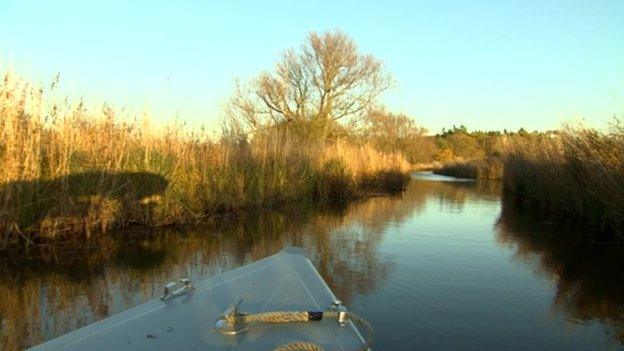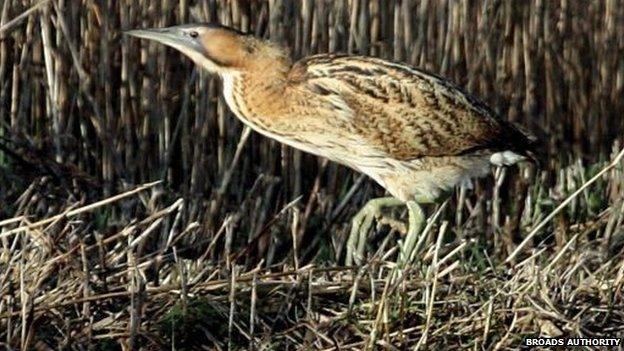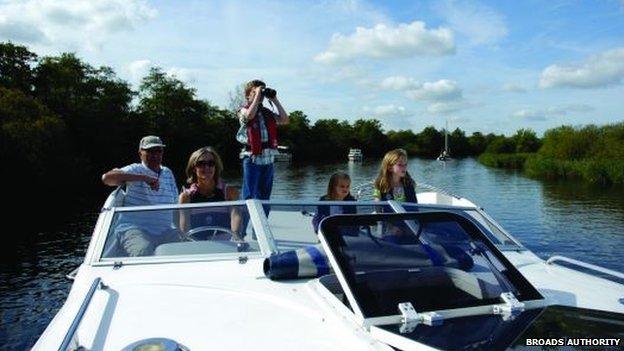The Broads: Who should run them?
- Published
- comments

The Broads Authority is responsible for boating on 125 miles of waterways in Norfolk and Suffolk
The Norfolk and Suffolk Broads are one of the most important tourist attractions in the East.
With 125 miles of navigable waterways, 190 miles of footpaths, 8m visitors a year, it's worth more than half a billion pounds to the local economy,
But are the people who run it properly accountable for their actions?
It's a question which some of the 6,000 people who live within the Broads Authority area have been asking for a while and it's one that came up on several occasions during the election.
The Broads Authority is in charge of looking after the waterways and promoting tourism to the area. It also has a big say in planning matters.
But the people who run it are not elected, they are chosen to sit on the board by either local councils or the Environment Secretary.
Last year, in the Queen's Speech, the government announced plans to hold direct elections to the Broads Authority and all other national parks.

The Broads are a haven for wildlife and the habitat is home to many rare species
"The main benefits of the Bill would be to improve local accountability, without necessarily increasing numbers (and) address a local democratic deficit," declared the briefing note which accompanied the speech.
Now it's been revealed that the plans have been scrapped.
"The democratic element on the Broads Authority is represented by the fact that the majority of people serving on the board are elected," Defra minister Rory Stewart told MPs.
He added that deciding who sat on the board "ensures that we have a broad range of people with both environmental and navigation interests".
He was addressing a debate called by the MP for Broadland, Keith Simpson, who believes that a directly elected Broads Authority would be good for his constituents.
"If I were being harsh, which I am not, I might argue that the Broads Authority is a quango," he told the debate.
"Ultimately, those representatives are all nominated, and now is the time to consider how we could have a truly elected part - although not necessarily a truly elected whole - of the Broads Authority."
The MP for North Norfolk, Norman Lamb, said he was appalled that the idea had been dropped.
"There was overwhelming support in the Broads, and certainly in my constituency, for the idea that the local community should have a say, through a directly elected person or preferably persons, on the board of the Broads Authority," he said.
"That has been the case in similar authorities in Scotland for some years, and the world has not caved in".
Holding direct elections to the Broads Authority had thrown up a number of difficulties.

Thousands of people from all over the world travel to the Broads for holidays
Who would be allowed to vote, for instance, given that many of those who work on the Broads live outside the area?
Would people stand as individuals or with the backing of a political party? Mr Simpson believed those obstacles could be overcome.
He reflected afterwards that he was disappointed by the decision: "I will make further enquiries about why an idea which we were so keen on last year has now been dropped."
It may well have been dropped because it was a Liberal Democrat idea.
Government sources tell us that with several high profile Lib Dems having constituencies in or near National Parks, the party was very keen to get the measure into last year's Queen's Speech. Now that the Lib Dems have gone, so too have the plans.
The Broads Authority told us: "Nine out of 21 members are elected councillors from all the constituent local authorities and a third are toll payers to ensure that the views of local people and boat owners are heard. They are joined by national Secretary of State appointees, which are posts open to everyone.
"We also consult locally on a wide range of issues and have a number of engagement mechanisms".
The South Norfolk MP, Richard Bacon, told the debate that he didn't believe that this was the most important issue on the Broads. His constituents were more concerned about the threat to boating interests.
But it is clear that some people have felt strongly about this issue. Will they now let the matter rest or will they keep on campaigning for directly elected representatives?